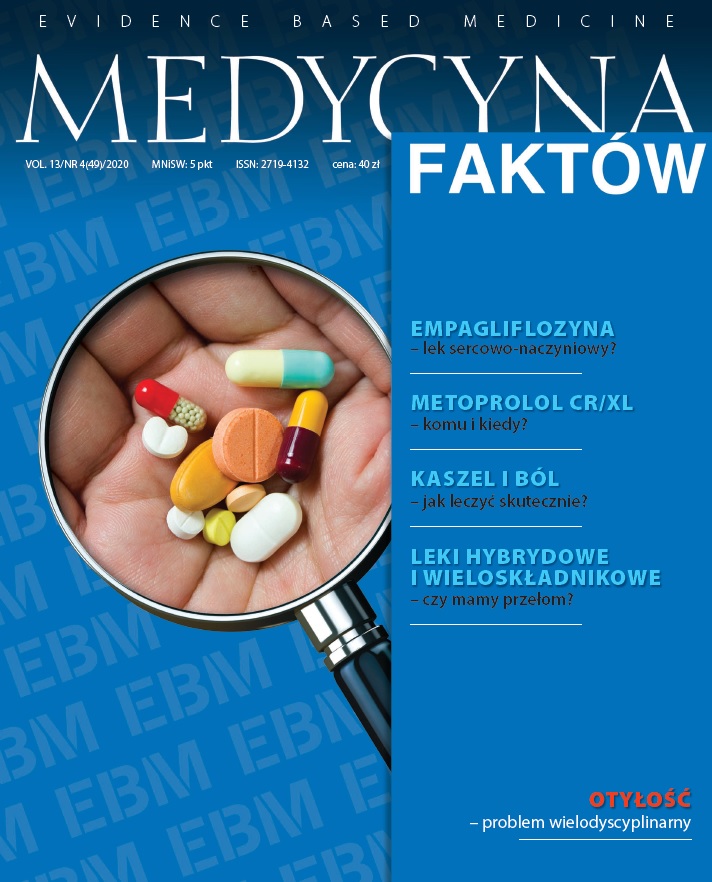Ból – jak leczyć go skutecznie i bezpiecznie w dobie COVID-19? Artykuł przeglądowy
##plugins.themes.bootstrap3.article.main##
Abstrakt
Zdrowotne skutki epidemii COVID-19 dotyczą nie tylko układu oddechowego, ale także ogólnego stanu człowieka. Wynika to z wprowadzanych ograniczeń, które skutkują zmniejszoną ilością wysiłku fizycznego, co może prowadzić do rozwoju i zaostrzeń dolegliwości bólowych w układzie ruchowym. Ze względu na ograniczenie dostępu do lekarzy wielu pacjentów może samodzielnie próbować modyfikować farmakoterapię, dlatego też jeszcze większego znaczenia nabiera obecnie bezpieczeństwo ordynowanych leków przeciwbólowych.
##plugins.themes.bootstrap3.article.details##
Jak cytować
Rupiński , R. (2020). Ból – jak leczyć go skutecznie i bezpiecznie w dobie COVID-19?. Medycyna Faktów , 13(4(49), 449-452. https://doi.org/10.24292/01.MF.0420.10
Numer
Dział
Artykuły
Copyright © by Medical Education. All rights reserved.
Bibliografia
1. Kolasinski SL, Neogi T, Hochberg MC et al. 2019 American College of Rheumatology/Arthritis Foundation guideline for the management of osteoarthritis of the hand, hip, and knee. Arthritis Care Res. 2020; 72(2): 149-62.
2. Lindhardsen J, Gislason GH, Jacobsen S. et al. Non-steroidal anti-inflammatory drugs and risk of cardiovascular disease in patients with rheumatoid arthritis: a nationwide cohort study. Ann Rheum Dis. 2014; 73: 1515-21.
3. Samborski W, Sikorska D, Niklas A et al. NLPZ a powikłania sercowo-naczyniowe i gastroenterologiczne – algorytm wyboru. Forum Reumatol. 2018; 4(3): 143-51.
4. Coxib and traditional NSAIDs Trialists Collaboration. Vascular and upper gastrointestinal effects of non-steroidal anti-inflammatory drugs: meta- analyses of individual participant data from randomised trials. Lancet. 2013; 382: 769-79.
5. van Soest EM, Valkhoff VE, Mazzaglia G et al. Suboptimal gastroprotective coverage of NSAID use and the risk of upper gastrointestinal bleeding and ulcers: an observational study using three European databases. Aliment Pharmacol Ther. 2007; 26(2): 265-75.
2. Lindhardsen J, Gislason GH, Jacobsen S. et al. Non-steroidal anti-inflammatory drugs and risk of cardiovascular disease in patients with rheumatoid arthritis: a nationwide cohort study. Ann Rheum Dis. 2014; 73: 1515-21.
3. Samborski W, Sikorska D, Niklas A et al. NLPZ a powikłania sercowo-naczyniowe i gastroenterologiczne – algorytm wyboru. Forum Reumatol. 2018; 4(3): 143-51.
4. Coxib and traditional NSAIDs Trialists Collaboration. Vascular and upper gastrointestinal effects of non-steroidal anti-inflammatory drugs: meta- analyses of individual participant data from randomised trials. Lancet. 2013; 382: 769-79.
5. van Soest EM, Valkhoff VE, Mazzaglia G et al. Suboptimal gastroprotective coverage of NSAID use and the risk of upper gastrointestinal bleeding and ulcers: an observational study using three European databases. Aliment Pharmacol Ther. 2007; 26(2): 265-75.
